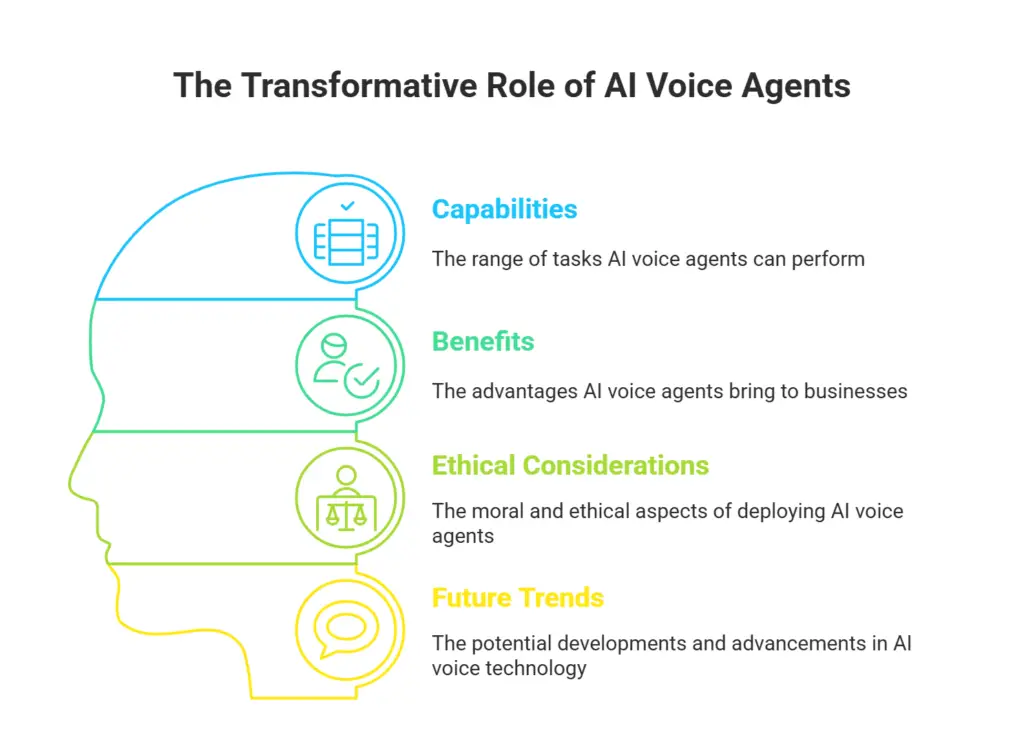In the bustling world of commerce, the sound of a voice has always been a cornerstone of connection. From the friendly greeting of a salesperson to the reassuring tone of a support agent, the human voice has the power to build trust, solve problems, and drive business forward. But what if that voice wasn’t human at all? The rise of sophisticated AI voice agents is no longer a futuristic fantasy; it’s a present-day reality that’s quietly revolutionizing how businesses interact with their customers. These intelligent systems are not just answering calls; they’re actively engaging in complex conversations, qualifying leads, and providing nuanced support, heralding a new era of efficiency and customer experience.
This article delves into the transformative role of AI voice agents in both sales and support, exploring their capabilities, the significant benefits they bring, and the crucial ethical considerations that must accompany their deployment. We’ll examine how these digital counterparts are augmenting human teams, breaking down the traditional barriers of business communication, and what the future holds for this rapidly evolving technology.

Boosting the Bottom Line: AI Voice Agents in the Sales Arena
The sales floor has always been a high-energy environment, driven by targets, deadlines, and the constant pursuit of the next big deal. However, a significant portion of a salesperson’s day is often consumed by repetitive, time-intensive tasks that, while necessary, detract from their core function: selling. This is where AI voice agents are making their most significant impact.
Lead Qualification and Scoring on Autopilot: One of the most critical yet time-consuming aspects of the sales process is lead qualification. Sales teams can spend countless hours sifting through long lists of potential customers, many of whom may not be a good fit for their product or service. AI voice agents can automate this entire process. By engaging leads in natural, intelligent conversations, these agents can ask targeted questions to gauge interest, determine budget, and identify key decision-makers. They can then score these leads based on predefined criteria and seamlessly pass the most promising prospects to their human counterparts. This not only frees up valuable time for the sales team but also ensures they are focusing their efforts on leads with the highest conversion potential.
24/7 Availability and Instant Follow-Up: In today’s global marketplace, opportunities don’t adhere to a 9-to-5 schedule. A potential customer might be Browse a website late at night or on a weekend. With AI voice agents, businesses can provide an immediate and engaging response, no matter the time of day. This instant follow-up can be the deciding factor in a competitive market, capturing a lead’s interest at its peak. Furthermore, for businesses with an international clientele, AI voice agents can effortlessly bridge time zone gaps, ensuring no lead is left waiting.
Data-Driven Insights and Personalized Outreach: Beyond their conversational abilities, AI voice agents are powerful data collection tools. Every interaction is a source of valuable information that can be analyzed to uncover trends, refine sales strategies, and personalize future outreach. By understanding common customer pain points, frequently asked questions, and key buying signals, businesses can tailor their messaging and approach for maximum impact. This data-driven approach moves sales from a game of intuition to a science of precision.
Elevating the Customer Experience: AI Voice Agents in the Support Sphere
In the realm of customer support, the pressure to provide timely, accurate, and empathetic assistance is immense. High call volumes, repetitive inquiries, and the need for around-the-clock availability can stretch support teams to their limits. AI voice agents are emerging as a powerful solution to these challenges, transforming the support landscape in several key ways.
Instantaneous Resolutions for Common Queries: A significant percentage of inbound support calls revolve around a handful of common issues, such as password resets, order status updates, or basic troubleshooting. AI voice agents can be trained to handle these high-volume, low-complexity inquiries with remarkable efficiency. This not only provides customers with immediate answers to their questions but also frees up human agents to focus on more complex, emotionally charged, or high-stakes issues that require a human touch.
Reducing Costs and Improving Scalability: For call centers, staffing is a major operational expense. The need to have enough agents on hand to manage fluctuating call volumes can lead to inefficiencies and high overheads. AI voice agents offer a cost-effective way to scale support operations. They can handle a virtually unlimited number of calls simultaneously, eliminating wait times and ensuring that every customer is attended to promptly. This scalability is particularly valuable for businesses experiencing rapid growth or seasonal peaks in demand.
A Human-in-the-Loop for Seamless Service: It’s important to view AI voice agents not as a replacement for human support teams, but as a powerful extension of them. The most effective implementations of this technology embrace a “human-in-the-loop” approach. This means that if an AI agent encounters a query it cannot resolve or if a customer expresses a desire to speak with a person, the call can be seamlessly transferred to a human agent. This collaborative model ensures that customers receive the best of both worlds: the speed and efficiency of AI and the empathy and nuanced understanding of a human expert.

Navigating the New Frontier: Ethical Considerations and the Path Forward
The increasing sophistication of AI voice agents brings with it a host of ethical considerations that businesses must carefully navigate. As these systems become more adept at mimicking human conversation, the lines between human and machine can blur, raising important questions about transparency, privacy, and accountability.
Transparency and Disclosure: It is crucial that businesses are transparent with their customers about when they are interacting with an AI agent. Attempting to pass off an AI as a human is not only deceptive but can also erode trust. A simple, upfront disclosure can set clear expectations and prevent any feelings of being misled.
Data Privacy and Security: AI voice agents, by their very nature, collect and process vast amounts of data, some of which may be sensitive. Businesses have a profound responsibility to protect this data, ensuring it is collected and used ethically and in compliance with all relevant privacy regulations. This includes being transparent about what data is being collected and for what purpose.
Bias and Fairness: The algorithms that power AI voice agents are only as unbiased as the data they are trained on. If the training data contains inherent biases, the AI agent may perpetuate or even amplify those biases in its interactions. It is imperative that businesses take proactive steps to mitigate bias in their AI systems, ensuring they treat all customers fairly and equitably.
The journey of AI voice agents in sales and support is just beginning. As the technology continues to evolve, we can expect to see even more sophisticated applications, from hyper-personalized sales pitches to proactive customer support that anticipates a customer’s needs before they even arise. The businesses that will thrive in this new landscape are those that embrace this technology not as a mere cost-cutting tool, but as a strategic asset for enhancing human capabilities and forging stronger, more meaningful connections with their customers. The future of business communication is here, and it’s speaking with an AI-powered voice.



